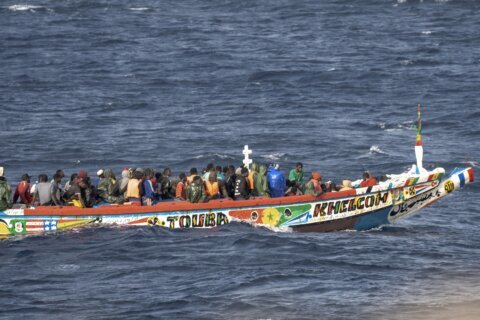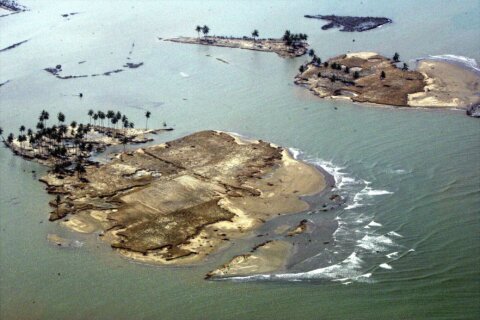ROME (AP) — More than a dozen humanitarian organizations that provide health care to migrants criticized Italy’s migration deal with Albania on Friday as violating the code of medical ethics, and urged health workers not to cooperate with it.
The deal, the centerpiece of Premier Giorgia Meloni’s crackdown on human trafficking, calls for some male migrants rescued at sea to have their asylum cases processed while they are detained at two holding centers in Albania, a non-EU nation.
Italy, which has long demanded Europe shoulder more of the continent’s migration problem, has held up the deal with Albania as a model for the continent and a strong deterrent to would-be refugees setting out on smugglers’ boats from North Africa for a better life.
But the five-year deal, which is budgeted to cost Italy 670 million euros ($730 million), has run into a series of obstacles and legal challenges that have prevented even a single migrant from being processed in Albania.
First, construction delays prevented the opening of the centers for several months. Then, after the first two batches of 20 men were brought to Albania this month, Italian courts issued rulings that resulted in them being taken to Italy anyway.
The matter is now before the European Union’s Court of Justice in Luxembourg, which has been asked to rule on whether the men come from countries deemed safe for return. All 20 hail from Bangladesh and Egypt.
On Friday, the non-governmental organizations released a detailed analysis of the procedures to screen migrants first on Italian naval ships, and then in the Albanian centers, to determine if they are “vulnerable.” Only men deemed to be not “vulnerable” are to be sent to Albania.
The aid groups said there were no proper facilities or instruments to make such a determination. And regardless, practically everyone who has set off on the dangerous Mediterranean crossing has endured the type of physical, psychological or sexual abuse that should disqualify them from Albanian detention, they said.
The migrants should be considered at risk of post-traumatic stress disorder or other serious physical and mental health consequences, they said.
“The Italy-Albania Protocol violates the code of medical ethics and human rights and puts the physical and psychological health of migrants at risk,” the statement said.
The groups criticized the international organizations that are apparently cooperating with the project, identifying the International Organization of Migration and the Knights of Malta’s Italian rescue corps as being “complicit” in human rights violations.
The Knights of Malta strongly rejected the claim, denying their doctors and nurses were in any way taking part in the “selection” of migrants or where they disembark and said none had participated in the transfer of migrants to Albania. In a statement, the Knights said their medical teams had worked on Italian naval vessels rescuing migrants in the Mediterranean since 2008, providing necessary first aid and said that work continues today unchanged.
The Knights “are proud of what has been accomplished in more than 15 years with the coast guard saving human lives at sea and has no intention of stopping this activity which often is the difference between life and death,” the group said.
There was no immediate reply to an email sent to the IOM seeking comment.
The Italian government has said the rights of the migrants would be fully guaranteed in the Albanian centers and the deal has been blessed by European Commission President Ursula von der Leyen as an example of “out-of-box thinking” to tackle the migration issue. But human rights groups say it sets a dangerous precedent and represents a violation of Italy’s obligations under international law.
The U.N. refugee agency has agreed to supervise the first three months of the agreement and one of its teams is conducting an “independent mission” on board the transfer ship to monitor the screening process.
The legal challenges have come despite the small number of people impacted so far. Even though the centers were built to house as many as 3,000 migrants a month, just 20 were transferred in the first two separate ship passages, only to be sent to Italy after the Rome courts intervened.
The statement was signed by Doctors’ Without Borders, Emergency, Sea-Watch, SOS Mediterranee and other aid groups.
Copyright © 2024 The Associated Press. All rights reserved. This material may not be published, broadcast, written or redistributed.







